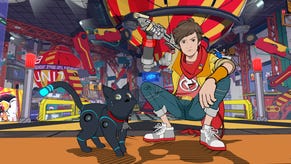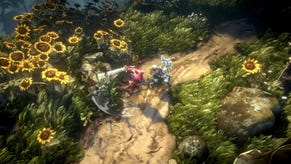Dark Futures Part 1: Randy Smith
The Ten Year anniversary of Deus Ex has lead to a week of looking back at RPS. But that bothered me a little. Deus Ex was about the future, after all. The question we should be asking is... what now? Hence this series of interviews with some of the brightest minds to have toiled in the field that Ion Storm Austin once called "Immersive Sims". First up is Randy Smith, a designer on the first two Thief games, the Project Lead on the Third, worked alongside Spielberg on an ill-fated EA project and has since released one of the IGF-winning Iphone games the form of Spider: Secret of Bryce Manor. As such, his perspective on the state of the genre is an interesting and - I suspect for some purists - a challenging one...
RPS: If I said the phrase “Immersive Sim” to you, what would be your immediate response?
Randy Smith: Well, I built the early part of my career on them, so I have a rich response... but when I think about them today, they do feel a little bit dated. A little late nineties and early 00s in vibe. There's not a lot of them going on – at least, being released. There's certainly some. Fallout 3 and Bioshock were considered successful games, by some standards. So it's not like they've disappeared... but while this may be my shifting attention, it seems that you see a lot of Rockstar Stuff – whether Red Dead Redemption or GTA – getting a lot of attention and having a very different vibe.
RPS: I remember in 2003 or so chatting to you and you were very open about drawing a line between what Ion Storm Austin and Rockstar were doing. How would you characterise the differences and similarities?
Randy Smith: I guess GTA is a very emergent game. Highly simulated... so they have the “Sim” part. And they're using it in a very similar way we used to do. But the “Immersive” part? They don't do it the same way. Immersive, to us, meant it was a game that tried to dissolve the boundaries and distance between the user and the experience as much as possible. To try and make you feel as if you were looking through the eyes of the characters into a full, rich world. And some of that GTA does – they're good at modelling complicated world. But not quite so much about putting you in the feet of an entity living in those worlds. They keep you at a distance. That's the biggest difference. The Sim part is very similar in spirit. The immersive point not so much.
RPS: So they're using some similar techniques, but at a completely different target.
Randy Smith: I feel like Immersive Sim and other similar terms in how we genre-ify videogames is similar to how we genre-ify music. Like punk rock is a genre of music. And I think Immersive Sim is a genre of game. But Punk Rock has a number of sub-genres, and so do videogame genres – like action or whatever. And Immersive Sims feel kind of like a sub-genre. And I kind of wonder how current they are right now.
The way we've done immersive sims in the past has very much been focused on Sci-fi and Fantasy story-lead adventures. So we're taking something that's a sub-genre already and then on top of that, we're adding a whole load of other rules, like it should always be an Action-Adventure with a rich story. And some of the time – though not all of the time – you play an anonymous character you can fill out with your own sense of how they should behave. And you usually have superpowers – whether they're magic spells or bionics or whatever. And we end up applying so many rules to sub-genre, it's a little bit stuck doing the thing it does.
Based on my own predilections about the future of videogames I really hope the simulations we start working on have more to do with characters or have more to do with the types of situations which would appear in the types of films which us so-called mature-adults would watch... and less about wizards and bionic-warriors who work for shadow governments. That stuff is interesting and cool, but we're a little stuck in it – like a lot of videogames. But if you're going to try and make Heavy Rain or Indigo Prophecy into a better game, dealing with some of those topics, could that be an immersive sim? We've seen first-person interaction simulations like Façade which had their challenges... and I think part of the challenges is how this sub-genre of immersive Sims applies to these kind of problems.
The thing with looking through a character's eyes, when I think about the possibility of applying the sub-genre to the topics which I hope videogames will increasingly cover... it's not clear that the sub-genre applies well. What is it that you do when you interact with characters or deal with emotional topics? It's much less the case that you wander around a big world and explore it and unravel the mystery of it and pull levers, which is what goes on in immersive sims. Plus shooting things, of course. With spells or cybernetics.
RPS: So it's the lack of questioning core assumptions which is the problem?
Randy Smith: When I thought about this... I thought that Immersive Sims are great, but what we see in FallOut 3 and Bioshock and the next game from Arkane... are likely to bear a lot in common with what we saw in 1992 with Ultima Underworld and 1998 with Thief, The Dark Project. They're going to be games where you inhabit a character who explores a world which has a mystery and you deal with conflicts by sneaking past it or killing it or casting magic spells at it. Or with the world simulation. Which is cool... but it's like racing games, in a way. I don't want to play the next racing game very badly either.
RPS: I think the genre/sub-genre metaphor is a good one. I've just finished a comic about New York punk in the 1970s, so I've been chewing this over. That was an interesting sub-culture of music. Fast forward to 2001, and you've got the Strokes, reviving some of that material, with a modern sheen. But it's not the same thing at all. What it means in 2001 is different than 1977 or whatever.
Randy Smith: That's almost the same metaphor I was thinking of. The Strokes were an interesting revival of something which happened a while ago. There's these sub-genre scenes which are very current and modern and resonant and relevant to the time they occur in... and then people move on. And then people were very into synthesisers. And then years later, some of those scene qualities which made NY Punk relevant kind of resonate again... and then you have the Strokes, right after September 11th people are angsty in that way, which matches the Zeitgeist. And it's interesting that the Strokes second album, which seemed to be as good an album as the first one, didn't strike the same popular or critical chord. It's because that year was over. And videogames don't seem to think they confirm to the same standard. They seem to think they can keep on making the same game forever, whether it's a racing game or an immersive sim or whatever.
RPS: In the round-table discussion which kicked off this carnival of Navel gazing, one of the things which popped up was the simple “why are we talking about it”. Which lead to the idea that we felt that it was a game that was inevitable. It was how we in the 90s saw the future of games... when in fact, it was the ending of that era. It wasn't a step to anywhere. And – what I didn't say – is that the idolising of that period is just proving what old men we are.
Randy Smith: To a degree. When Thief came out, it was very timely and felt very fresh and original. And I had similar feelings about DX... but I think the sequels tend to lose a little bit, much like the Strokes album. Not because they're worse, or even because you've done it already, but because it's not that time any more. To connect it back to everything I said earlier, I don't think of Immersive Sims as lost and gone forever... and Bioshock and Fallout 3 show that it carries some weight, and as a genre there's stuff you can do with it.
But when I think of the deeper future of game, much like the excitement we tapped into back in the 90s and thinking about what's the coolest, newest thing we can do with a game. I think you have re-imagine what you can do with the sub-genre... and to me, that won't be making a game just like Thief, but you're a bionic assasin. That's not good enough. It needs to be something that people haven't done with the sub-genre before, or something that has emotional content that's very timely with the Zeitgeist. And people don't really think about making games this way. They think “Wouldn't it be cool to be a bionic assasin”. Which is kind of sad.
RPS: I dunno. I kinda would like to be a bionic assassin. So... looking forward, how can you see stuff in the sub-genre could work better with the zeitgeist, or be something new?
Randy Smith: Everyone's read Neuromancer, which feels like a good reference point to use. When I think of Neuromancer, I think of Chiba City, I think of seedy back alleys, doctors who will implant cybernetics for hacking, going into a crazy Gibson-esque cyberspace, meeting up with prostitutes who have the secret password to some Yakuza bosses' server or whatever. All that stuff is very appropriate to an Immersive Sim, because it's very environmentally vivid. It's got a fair amount of walking around and different contexts. But at the same time the appeal of Neuromancer isn't just the fetishism of technology - though that's part of it. It's also about interacting with this society.
It's not characters exactly – it's this society which has a texture which comes through in the book. Something like that could be really slick to play in an immersive sim. What you're doing is walking around and interacting with different characters – but sometimes you're logging into Cyberspace and talking to people, getting responses. Maybe the cops show up, and everybody runs – then there's a bit of running. A lot of stuff going on, but not what you tend to do in Immersive sims, which is frankly crouch in a corner and shuffle through your various mods and spells and decide which one to cast into the environment to set fire to something so there's an explosion. Immersive Sims are very focused on the player power-ups and the environment interacting with it.
RPS: One of the standard drums I beat is that context-as-narrative is one of the things which games arguably do better than any other media. Moving through a textured environment, and getting everything from that.
Randy Smith: I very much agree with you... but I'm trying to take it a little further. What you've mentioned is why I think that something like a Neuromancer game could be a cool next-gen Immersive Sim. But the difference I want to see isn't that the fundamental gameplay that you're engaged in ... well, that the fundamental gameplay isn't that you're shooting cyber-spells at cyber-ICE. I want you to be doing the things that actually happen in that book. The society, the characters. Almost playing a movie in first person – but not a movie about shooting people.
RPS: I never thought of this as an Immersive Sim before, but Pathologic was kind of in this area. I know you haven't played it, but it was basically a Russian award winning game set in a city with cancer. Quinns wrote loads about it, but one of the more novel things it did was to create a desperate situation via limiting the food in the world. It was a game which when you got a gun, you'd sell it for bread, grateful you can eat today.
Randy Smith: That's a pretty good example. It is an Immersive Sim. You are this character and the world is realistic enough to suspend your disbelief, as much as it's possible for a videogame. And there's a simulation which allows you to decide, as a player, what agency you have. But it's not about spells or cybernetics.
RPS: Talking personally, where do you see yourself going and doing in the future? Spider was something of a triumph.
Randy Smith: Hopefully that's because what seemed fresh and current to me. I'm drawn to the challenge of taking some mature – as in, not especially advanced or sophisticated, really – design ideas from games we've developed over the years, and finding a way to package them up in a way which works for a more mainstream and casual market. I wanted to reach people who own cell-phones. As in, everybody. As opposed to people who own X360s, which means hardcore gamers with a set of expectations on what games are meant to be. That's the challenge which I thought was exciting. Taking – frankly – those Looking Glass and Immersive Sim concepts about learning a story through environment and deciding what you're accomplishing in games... and finding a lightweight way to bring them to a wider audience.
It's kind of related... but I wasn't as excited to do it as an immersive sim, partially because I think that sub-genre comes with all these expectations which I'm trying to thwart not follow, and partially because they're massive and enormous and huge to make. I can make a large number of games like Spider in the time it would take to make even one game like Pathologic, let alone Deus Ex 3.
RPS: Something I'm talking to other people about is that looking at the 00s, I sort of saw it as a story of people trying to work out a way to make Immersive Sims sell enough to justify them. I didn't really think of you, with Spider, actually being part of that. With Spider what you said was keep ideas... and lob everything else. That's certainly a solution.
Randy Smith: The solution is to not use that sub-genre, at least what I found. But you can look at Fallout 3 and go “That's a solution”. It's interesting that you're asking that question and in the back of my mind I'm going “Oh yeah! You'll set it in an underwater dungeon that has an art-deco art style...”.
It's not always clear what's going to sell more or sell less. Bioshock in a way is a kind of surprise. I think Bioshock succeeded by being very combat orientated, because that's a clear and direct thing people understand. [Combat] has wonderful feedback and lots of good tension and stuff. I don't like to generate violence, but I understand the appeal of having combat in a videogame. They were like... “Let's just focus on that”. While Deus Ex, you could argue, focused on dialogue and story a lot, which pulls the player away from just very gratifying combat as often. And Thief, obviously, wasn't a very combat intensive game. So maybe the art-deco underwater theme is on one end of the scales... and being combat-focused was on the other. And it worked out, taking a rich combat centered game to a wide audience.
RPS: I was more about the actual specific moments of execution rather than the grand scale stuff. Accessibility issues. Questions of craft. Playing through Bioshock, I could see how carefully they were trying to make sure the core of the tools were clear in a way which didn't happen in Shock 2 or Deus Ex.
Randy Smith: There's an interesting comparison there. And another reason why I'm less interested in Immersive Sims right now – though, to answer your earlier question, I'm not against getting back to them, as I really do love the sub-genre and think you can do good stuff with it... but it's not where my heart is right now, nor within the reach of my current studio.
But it's an interesting point that in Bioshock to even get people to the point where they can do basic match-3 and using systems in the way we hope they are... takes a really long time. Like half an hour, if not an hour, plus tonnes of training and really slow, careful stuff... and you're still losing people along the way. While on Spider we get some – not all, clearly – of the same concepts which Immersive Sims are trying to reach people with... in two and a half minutes. We have people like my 5 year old nephew and my grandmother making webs of their own design to solve the problems. It's pretty cool. A lot less to do, and a lot of fat-trimming. Immersive Sims are pretty cumbersome and hard to work with as a designer.
RPS: And any final comments about the future of the Immersive Sim?
Randy Smith: I like the sub-genre and think it has lots of potential... but to make an immersive sim which I'm really excited about, we have to look deeper into the future and make something that would have genuinely surprised the living shit out of everyone at Looking Glass working on Thief.
RPS: That's the other reason why I want to do these forward looking interviews. I'm uncomfotable with any deification of the past. The “this was the best game ever and we'll never see its like again” response...
Randy Smith: Yeah, make another one! We've got the Eidos Montreal studios working on both sequels, and Arkane working on something... and I really hope to see new stuff. I liked Bioshock but it felt like a best-of hits of games that Looking Glass had already worked on.
RPS: Thanks for your time













